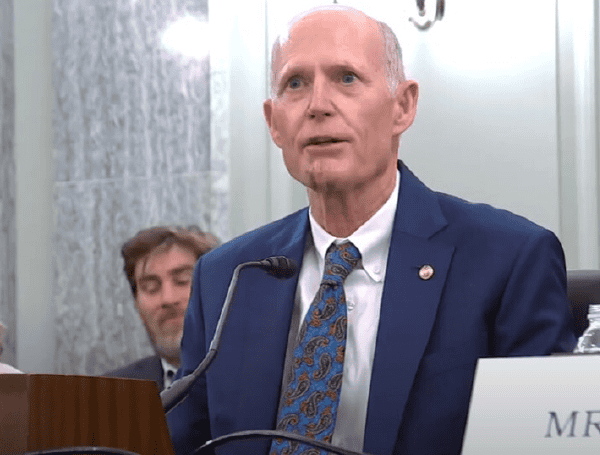Senators Rick Scott (R-FL), John Cornyn (R-TX), and a bipartisan coalition of colleagues reintroduced the “Licensing Aerospace Units to New Commercial Heights” (LAUNCH) Act on Thursday, a significant legislative effort aimed at streamlining the approval process for commercial space launches and the licensing of private remote sensing satellites.
The bill seeks to cut government red tape and duplicative regulations, a move strongly endorsed by the Commercial Spaceflight Federation.
READ: Youth Drain Is Real: California, NY Losing Young People To Texas, Florida, And North Carolina
The LAUNCH Act comes at a critical time as the United States strives to maintain its competitive edge in the rapidly evolving global space industry, particularly in the face of accelerating space ambitions from nations like China.
Senator Rick Scott emphasized the importance of the legislation for Florida’s thriving Space Coast. “Florida’s Space Coast is where our nation’s brightest minds innovate and help America reach for the stars,” said Senator Scott. “This incredible growth and success have been driven by effective public and private partnerships pushing our nation to the forefront of space exploration. I’m honored to work alongside my colleagues in introducing the LAUNCH Act to eliminate unnecessary government bureaucracy and support American businesses in the space industry.”
READ: Middle East Braces For Conflict: Israel Reportedly Readies Iran Strike Amid Stalled Nuclear Talks
“As the pace of China’s space ambitions accelerate, the Federal Aviation Administration must be able to approve commercial space launches quickly and efficiently in order to maintain our competitive edge,” stated Senator Cornyn. “By reducing bureaucratic hurdles for innovators, this legislation would drive scientific advancement and ensure America stays one step ahead of our adversaries in space and beyond.”
Senator Ben Ray Luján (D-NM) underscored New Mexico’s pivotal role in space exploration and innovation, citing Spaceport America, Kirtland Air Force Base, and White Sands Missile Range.
“New Mexico is already at the forefront of our country’s leadership in space exploration and innovation,” said Senator Luján. “That’s why I’m proud to join Senator Cornyn to introduce this bipartisan legislation that will streamline federal oversight for commercial space flights. This bill will ensure regulations are modernized and up-to-date, allowing New Mexico to continue our leadership.”
Senator Mark Kelly (D-AZ) also voiced his support for the bill, emphasizing the need to update outdated regulations. “Outdated regulations shouldn’t hold back the advancement of commercial spaceflight,” Senator Kelly remarked. “The LAUNCH Act will support innovation and increase competition in the commercial space industry by modernizing the regulations that govern launch and reentry.”
READ: Acting ICE Director Describes What His ‘Brave Men And Women’ Are Deling With In LA
The LAUNCH Act proposes several key changes to achieve its objectives:
Evaluation of Part 450 Implementation: The bill mandates an evaluation of the FAA’s Part 450 regulations within 120 days of enactment to assess their impact on the commercial spaceflight industry, including potential uncertainties and operational delays.
Aerospace Rulemaking Committee: The legislation calls for continued support for an Aerospace Rulemaking Committee, comprised of commercial space transportation providers, to recommend amendments to Part 450 and serve as a long-term forum for industry perspectives.
Encouraging Innovation: The Secretary of Transportation would be tasked with continuously evaluating and modifying licensing requirements to encourage innovative new technologies and operations.
Streamlining License Applications: The bill proposes modifications to license application procedures, including accepting reasonable safety rationales from applicants and assigning a dedicated licensing team lead to assist applicants. It also aims to eliminate duplicative review processes with other agencies.
READ: Florida Supreme Court Clarifies Mandatory State Attorney Costs, Resolving District Court Conflict
Digital Licensing System: A crucial provision of the bill is the establishment of a digital licensing, permitting, and approval system to accept, track, and provide status information for license and permit applications. This system aims to enhance transparency and efficiency.
Annual Briefings on Licensing Process: The Secretary of Transportation would be required to provide annual briefings to Congress on the commercial space licensing and permitting process, including metrics on application timelines and efforts to streamline reviews.
Direct Hire Authority for FAA: The bill grants the Secretary of Transportation direct hire authority for positions related to space launch and reentry licensing and permit activities within the Office of Commercial Space Transportation.
Establishment of Commercial Space Transportation Administration: The LAUNCH Act proposes the establishment of a Commercial Space Transportation Administration within the Department of Transportation, headed by an Administrator reporting directly to the Secretary, to oversee commercial space launch and reentry activities.
Flight Safety Analysis Workforce: The legislation calls for a report on the roles, responsibilities, and expertise in flight safety analysis across government agencies and encourages memoranda of understanding to leverage federal range personnel for commercial flight safety analysis.
Streamlining Remote Sensing Satellite Licensing: The bill also addresses the licensing of private remote sensing space systems, clarifying regulatory authority, facilitating license applications through dedicated licensing officers, and promoting transparency and expedited review processes.
GAO Report on Remote Sensing Industry: Finally, the LAUNCH Act mandates a Government Accountability Office (GAO) report on the Department of Commerce’s policies and regulations concerning the private remote sensing space industry, assessing their impact and recommending improvements to promote U.S. leadership.
The reintroduction of the LAUNCH Act signals a bipartisan commitment to fostering a more agile and competitive U.S. commercial space industry, recognizing the critical role of streamlined regulations in driving innovation and maintaining global leadership in space.
Please make a small donation to the Tampa Free Press to help sustain independent journalism. Your contribution enables us to continue delivering high-quality, local, and national news coverage.
Connect with us: Follow the Tampa Free Press on Facebook and Twitter for breaking news and updates.
Sign up: Subscribe to our free newsletter for a curated selection of top stories delivered straight to your inbox.
